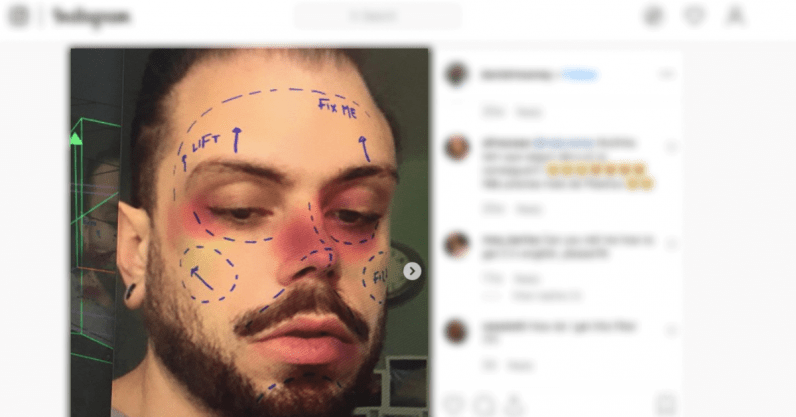If your Instagram feed is anything like mine, it’s littered with timelapses of injected lip fillers, Kardashian-promoted beauty products, and Story filters that “enhance” your face. The subliminal pressure to be “perfect” is no longer subliminal, and it’s putting more more of a strain on young users more than ever.
This is why Instagram is planning to remove all AR filters that depict or are associated with cosmetic surgery. Over the past few months, filters like “Plastica” — an effect that gives you extreme plastic surgery — have become increasingly popular, even viral. But with their rapid popularity comes growing concerns over the impact they may have on young people’s body image.

Back in August, Facebook announced its (previously invite-only) tool to create face filters — Spark AR Creators – was open to the public, allowing anyone to create and publish effects for use in Instagram Stories. With this came a flood of more problematic filters, such as “Fix Me” an effect which illustrates the pen-markings of pre-surgery, including a nose job, eyebrow lift, and cheek fillers.
Although Spark AR didn’t design the filter, it did approve the filter to be used by its one billion users on Instagram Stories. A post published by Spark AR Creators stated that it wants its filters “to be a positive experience and are re-evaluating its existing policies as they relate to well-being.” While its policies are being reviewed and updated, Facebook is removing existing filters like “Fix Me,” and postponing the approval of any similar new effects.
This news comes shortly after Facebook and Instagram announced they will tighten their policy on posts related to cosmetic surgery and weight loss products by hiding related posts from users known to be aged under 18. This update includes the removal of any content that makes a “miraculous” claim about a diet or weight-loss product linked to a commercial offer, such as a discount code or affiliate link.
It’s reassuring to see Instagram and Facebook take responsibility for what they’ve been hosting, but it remains to be seen how proactively they will respond to issues of mental and physical health in the future.
This article is republished from The Next Web under a Creative Commons license. Read the original article.

Share your thoughts and join the technology debate!
Be the first to comment